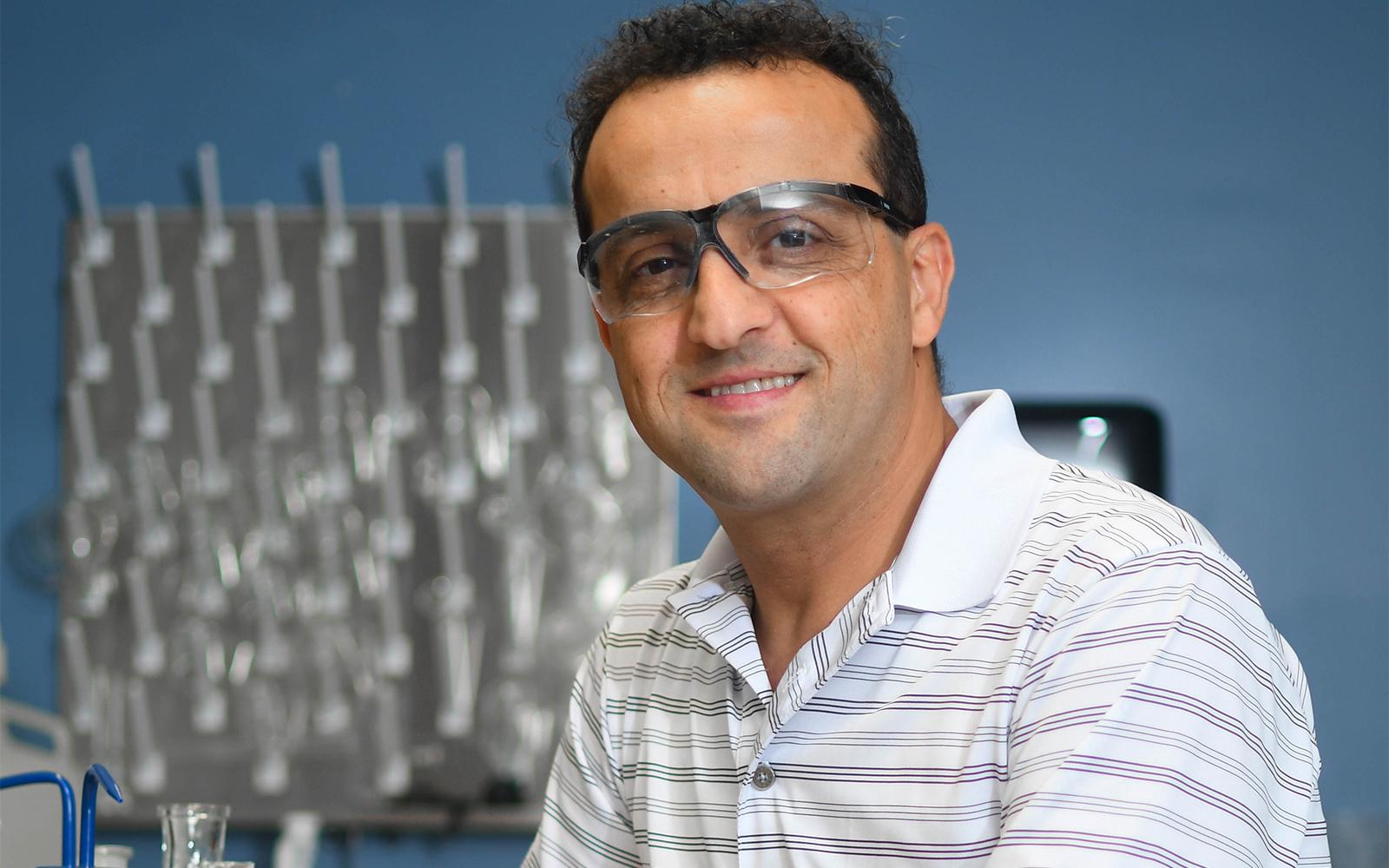SUNY Potsdam Chemistry Professor Dr. Fadi Bou-Abdallah Receives $387,030 Grant Award from the National Science Foundation

Dr. Fadi Bou-Abdallah, a professor of chemistry at SUNY Potsdam, has received a $387,030 grant from the National Science Foundation to support his research on ferritin.
SUNY Potsdam Chemistry Professor Dr. Fadi Bou-Abdallah has received a research grant award of $387,030 from the National Science Foundation for work over the next three years to better understand the body’s storage and release of iron, and how imbalances in those mechanisms may lead to iron-related diseases, including Parkinson’s and Alzheimer’s.
Bou-Abdallah and his students have pioneered a unique method of creating a synthetic protein called isoferritin, allowing for study that was previously not possible in the eight decades following the discovery of the isoferritin nanostructure-assembly and its iron cores. Ferritins are proteins that store and release iron, regulating its presence in most animals. The study of ferritins’ internal mechanisms has been hampered by the lack of a system for artificially creating sufficient quantities of isoferritin.
The SUNY Potsdam chemistry professor has overcome this hurdle using a unique plasmid capable of producing large amounts of these biomolecules. Many research groups around the world have previously attempted this process unsuccessfully, Bou-Abdallah said.
“What is so unique about our approach is our ability to synthesize almost any isoferritin structure that mimics native ferritins extracted from different animal tissues and organs. To achieve that, we designed and optimized a novel ferritin expression system that allows the synthesis of any desired ferritin nanostructure,” Bou-Abdallah said.
Iron deregulation and its accumulation in different organs has been linked to increased inflammation and oxidative stress, heart disease, cancer and a growing number of iron-induced neurological conditions. The role of iron in neurodegenerative diseases has been firmly established — including in Pick’s disease, Huntington’s disease, progressive supranuclear palsy, Friedreich’s ataxia, amyotrophic lateral sclerosis (ALS), prion disease and neuroferritinopathy.
“Clearly, excess free iron is the main source of oxidative stress causing neurons and cell damage, a hallmark in aging diseases,” Bou-Abdallah said.
The goal of the NSF grant award is to further optimize the protein expression system and characterize the structure-function relationships of these complex iron storage molecules and the dynamics of iron metabolism in humans.
“This grant, together with Dr. Bou-Abdallah’s earlier National Institutes of Health grant, will enable him to provide students with meaningful research opportunities for the next few years, which is something we value greatly,” said SUNY Potsdam School of Arts and Sciences Dean Dr. Gretchen Galbraith.
The funding follows a NIH grant for $414,047 which the professor received last September, for a total of more than $800,000 dedicated to his iron research. The grants will help prepare SUNY Potsdam chemistry students for future STEM careers in academia or industry. Undergraduates will be involved in performing all of the experiments proposed in the grant and will present their findings at regional and national conferences.
“These are exciting times for our students, particularly those interested in the sciences and the process of discovery,” Bou-Abdallah said. “A good portion of these funds will provide SUNY Potsdam undergraduates with summer support and training in modern biochemical and biophysical techniques, as well as in the laboratory skills necessary to address challenging questions in iron homeostasis and iron-related diseases.”
The National Science Foundation is an independent federal agency that supports fundamental research and education across all fields of science and engineering. To learn more, visit www.nsf.gov.
SUNY Potsdam’s Department of Chemistry offers a rigorous and well-balanced curriculum that provides a solid foundation for successful graduate study or a career in chemistry or a chemistry-related field. The department is known for its strong and diverse undergraduate research programs, its $3 million in grants to support teaching and research, and the success of its students’ acceptance to competitive graduate and professional schools. To find out more, visit www.potsdam.edu/academics/AAS/Chem.
About SUNY Potsdam:
Founded in 1816, The State University of New York at Potsdam is one of America’s first 50 colleges—and the oldest institution within SUNY. Now in its third century, SUNY Potsdam is distinguished by a legacy of pioneering programs and educational excellence. The College currently enrolls approximately 3,600 undergraduate and graduate students. Home to the world-renowned Crane School of Music, SUNY Potsdam is known for its challenging liberal arts and sciences core, distinction in teacher training and culture of creativity. To learn more, visit www.potsdam.edu.
